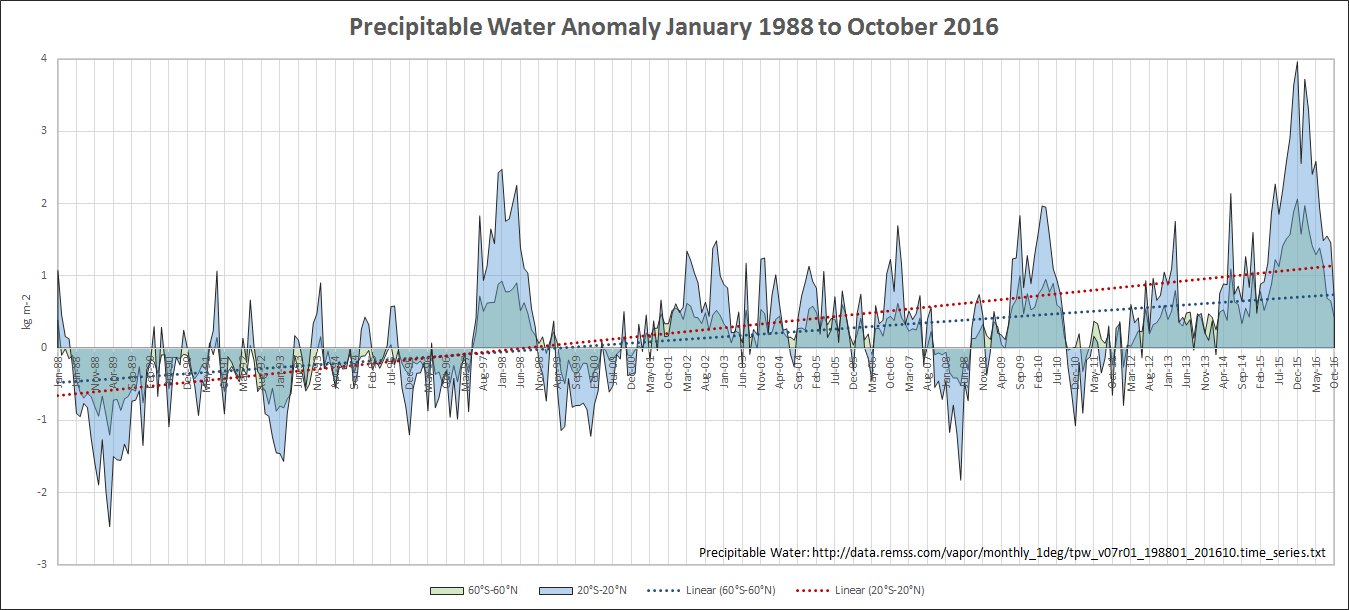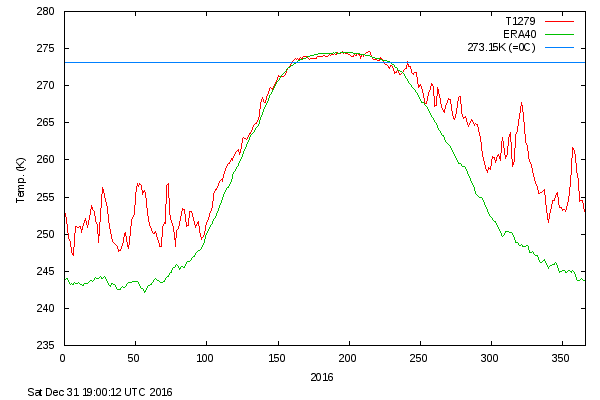Whether we're actually causing climate change or not,
We are causing climate change. Here is a simple explainer on it:
https://www.skepticalscience.com/print.php?r=109I know that this doesn't link rising global temperatures to the rise in ancient carbon expelled from the ground, but keep reading if you want to engage thoughtfully. What it does show, however, is that the ancient carbon we are digging out of the ground and burning is indeed causing the rise in carbon dioxide concentrations in the atmosphere, as the Earth is largely a closed system with the only effective input being solar energy and the only output being radiation loss to space, largely moderated by
greenhouse gases, mostly water vapor and carbon dioxide.
You may have heard that the carbon dioxide doesn't matter because the amount of water vapor in the atmosphere is so much greater, but this is simply the first of many different
spiralling feedbacks which amplify the amount of warming the planet experiences due to the increase in carbon dioxide concentrations, which is directly caused by coal, oil, and gas burning, when these materials were extracted from ancient rock layers anyway. The amount of water vapor in the atmosphere is largely
determined by the carbon dioxide content, meaning that if carbon dioxide is added to the atmosphere, then water vapor will evaporate and increase the global temperature further.
Here is a graphic showing the trend of increasing water vapor in the atmosphere (which is far more noisy than the carbon dioxide signal due to other factors determining how much water vapor is in the atmosphere as well):

is it possible that the ultimate result of it will actually be beneficial to us?
Overall? No. Our society depends on a stable global climate system to continue to function, and moving biomes along with the disappearance of areas along the coastline does not bode well for the future. Some areas will "benefit" in some sick way, for example the taigas of the world, mainly in Canada and Siberia. They will benefit because the taigas will burn up as the areas they are in become too warm to support the high water demand of coniferous trees and the forest stands are replaced with grasslands in drier regions or deciduous forests in wetter regions. These types of land are more easily exploitable and their warmer climate will be more livable for humans.
The obvious issue that people are concerned about are the poles melting and sea levels rising. However, unlike other fluids, water expands when frozen due to the way it forms the crystalline structures of ice. As it melts, it takes up less area than it did when frozen. Does this mean that the flooding wouldn't be as bad as people think?
Water does expand when frozen, however for ice that is sitting on top of the ocean such as ice shelves and sea ice, this is compensated for by the top bit of the ice being above the water when frozen, resulting in no net change in sea levels.
The issue here is all of the water which resides on land. Much of the bedrocks of Greenland and Antarctica rest above sea level, or just below sea level. If more than roughly 10% of the water locked in ice in the column is above sea level, it will raise global sea levels when it melts and joins the ocean. Here are maps of
the bedrock of Greenland, and
the bedrock of Antarctica.Since the Antarctic bedrock map does not have a scale, for reference the deepest parts of what are currently West Antarctica are about 2000 meters below sea level, and the highest points beneath the ice are around 3500 meters above sea level.
I am very worried about the glaciers which have their bases resting below sea level, because the mechanics of glaciers which have their bases resting in sea water are much more vulnerable to warming than the mechanics of glaciers whose fronts rest on land. The reason for this is because water carries an enormously larger amount of heat than air, as raising a 1kg parcel of water's temperature to 1C (34F) from the freezing point is the equivalent of raising a 1kg parcel of air's temperature to 36C (97F). Additionally, glaciers resting in water can calve icebergs which melt much faster, whereas glaciers resting on land can only have boulders of ice tumble down their slope or fall apart at the end of the glacier, which is a far slower process. Many of the glaciers which we are presently concentrating on, including Jakobshavn Glacier in Greenland, Petermann Glacier in Greenland, Pine Island Glacier and Thwaites Glacier, an interconnected complex of two massive glaciers in West Antarctica, are resting on bedrock that is below sea level and can therefore calve immense amounts of ice in a short period of time, raising global sea levels much faster than they otherwise would be able to do. There is one more feature to explain the worry: cliff faces. Glacial ice is not held together very strongly, so when there is a tall cliff face on the ocean, say, 500 feet tall, then it will likely collapse very rapidly until it re-achieves stability. The continued warming of the planet means that this point of stability continues to recede into the mountains, and in many cases, disappear entirely.
More moisture in the air also means more severe weather, but it also means more water getting to land. Will arid areas become less arid as a result?
This depends on which arid area you are talking about. In general, yes, they will receive more rainfall, but the rising temperatures will in many cases compensate entirely or overcompensate for this increase in precipitation. There are also arid regions where the amount of rainfall they will receive will decrease, notably the Great Basin and California. The main area which will benefit from increased rainfall is the Outback of Australia, where there are largely two stable states for the continent: a very arid one where the only regions with significant rainfall are around the edges, as it used to be; it is transitioning to a state where the Outback receives copious amounts of summer rainfall from tropical lows and other various thunderstorm activity.
Most water vapor in the atmosphere is evaporated from the ocean, but a significant contributor as well is plant life. Because of plant life, over the short term areas are much more susceptible to irreversible rapid drying than they are to irreversible rapid wetting.
With higher levels of CO2, our atmosphere becomes thicker, which means the average temperature will rise.
The atmosphere does not become thicker, as in increased air pressure, it becomes more opaque in the infrared, causing temperature to rise as more infrared photons are deflected back to Earth than continue out into space.
However, does it also mean the temperature will become more constant across the Earth? The Earth's average temperature is about 13* degrees Celsius, so if global temperatures rise but become more constant regardless of location on Earth, will the end result be that the global climate equalizes and ends up more habitable than before?
Yes! The global temperature will become more constant across the Earth. We can already see this in the Arctic with Arctic amplification this year going off the charts:

And it may become more habitable, but the climate system due to our massive pulse of carbon is trying to reach a new point of stability, which involves lots of melting of land ice, which takes a long time and therefore the instability of the system will continue to increase for the foreseeable future, causing weather to become more variable from year-to-year, not necessarily unpredictable. Also, the climate in the Northern Hemisphere may equalize, however the transition from our current Hadley, Ferrel, and Polar cells to a single Hadley cell is so messy and catastrophic that I and civilization would really prefer if it was avoided, as it is one of those things that could happen that is full of scary unknowns that may make regions that currently hold hundreds of millions of people uninhabitable deserts.
A thicker atmosphere also means more for the plants to turn into oxygen, and thus more for us to breathe. Will we be healthier as a result of the thicker atmosphere?
Again, the atmosphere will not be thicker, it will be more opaque. And yes, plants are and have been converting more and more carbon dioxide to oxygen, giving us a somewhat slower warming than we would otherwise be experiencing. Unfortunately, the form that it is immediately emitted in is carbon monoxide, which uses this chemical equation to turn into carbon dioxide:
2 CO + O
2 → 2 CO
2Pure carbon and wasted hydrocarbons are also emitted, resulting in four times the rate of oxygen loss as carbon dioxide gain:
http://scrippso2.ucsd.edu/There is also a very large unknown over whether phytoplankton in the ocean, which produce over 50% of global O
2 content, will continue to decline. In the Pacific Ocean, they have already declined by 30% and show no signs of slowing down.
Finally, the opposite is true. The difficulties in ventilating offices and other buildings will continue to grow as the maximum carbon dioxide level that humans tolerate will not increase while the carbon dioxide level of the atmosphere will continue to increase:
https://www.skepticalscience.com/print.php?n=2724